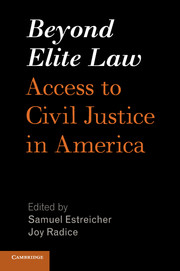Book contents
- Frontmatter
- Contents
- Beyond Elite Law
- Foreword
- List of Contributors
- Overview
- Overview
- PART I CURRENT STATE OF ACCESS TO LEGAL SERVICES
- PART II SOURCES OF LEGAL SERVICES ASSISTANCE FOR WORKING AMERICANS
- PART III FASHIONING A REFORM AGENDA
- 23 New York State Task Force to Expand Access to Civil Legal Services
- 24 New York's 50-hour Pro Bono Requirement
- 25 Starting a “Low Bono” Law Practice
- 26 Toward a More Effective and Accessible Solo and Small Firm Practice Model
- 27 Facilitating Homemade Wills
- 28 Court Facilitation of Self-Representation
- 29 Limited Representation and Ethical Challenges
- 30 Technology Can Solve Much of America's Access to Justice Problem, If We Let It
- 31 Mediation of Employment Disputes at the EEOC
- 32 AAA Consumer Arbitration
- 33 Saturns for Rickshaws: Lessons for Consumer Arbitration and Access to Justice
- 34 Employment Arbitration in the Securities Industry
- 35 FINRA Arbitration and Employment Disputes
- 36 Arbitration as an Employee-Friendly Forum
- 37 Access to Justice in Employment Arbitration: a Critical Look
- 38 Collaborative Technology Improves Access to Justice
- 39 Union Representation in Employment Arbitration
- 40 Legal Representation for New York City's Chinese Immigrant Workers
- 41 Reassessing Unauthorized Practice of Law Rules
- 42 The Pyett Protocol: Collectively-Bargained Grievance Arbitration as a Forum for Individual Statutory Employment Claims
- PART IV CREATING A CULTURE OF SERVICE
- Index
33 - Saturns for Rickshaws: Lessons for Consumer Arbitration and Access to Justice
from PART III - FASHIONING A REFORM AGENDA
Published online by Cambridge University Press: 05 May 2016
- Frontmatter
- Contents
- Beyond Elite Law
- Foreword
- List of Contributors
- Overview
- Overview
- PART I CURRENT STATE OF ACCESS TO LEGAL SERVICES
- PART II SOURCES OF LEGAL SERVICES ASSISTANCE FOR WORKING AMERICANS
- PART III FASHIONING A REFORM AGENDA
- 23 New York State Task Force to Expand Access to Civil Legal Services
- 24 New York's 50-hour Pro Bono Requirement
- 25 Starting a “Low Bono” Law Practice
- 26 Toward a More Effective and Accessible Solo and Small Firm Practice Model
- 27 Facilitating Homemade Wills
- 28 Court Facilitation of Self-Representation
- 29 Limited Representation and Ethical Challenges
- 30 Technology Can Solve Much of America's Access to Justice Problem, If We Let It
- 31 Mediation of Employment Disputes at the EEOC
- 32 AAA Consumer Arbitration
- 33 Saturns for Rickshaws: Lessons for Consumer Arbitration and Access to Justice
- 34 Employment Arbitration in the Securities Industry
- 35 FINRA Arbitration and Employment Disputes
- 36 Arbitration as an Employee-Friendly Forum
- 37 Access to Justice in Employment Arbitration: a Critical Look
- 38 Collaborative Technology Improves Access to Justice
- 39 Union Representation in Employment Arbitration
- 40 Legal Representation for New York City's Chinese Immigrant Workers
- 41 Reassessing Unauthorized Practice of Law Rules
- 42 The Pyett Protocol: Collectively-Bargained Grievance Arbitration as a Forum for Individual Statutory Employment Claims
- PART IV CREATING A CULTURE OF SERVICE
- Index
Summary
Companies are increasingly requiring consumers to agree to arbitrate disputes they may have over the products or services they purchase. Pre-dispute arbitration agreements are controversial especially for consumer disputes, where, it is feared, consumers will not represent themselves and neither will lawyers come forward because of the small stakes involved in individual claims. Dean Rutledge addresses in this chapter whether consumer arbitration processes can be designed to provide greater access to justice for consumers.
Over a decade ago, Professor Samuel Estreicher laid plain the terms of the policy debate over arbitration of employment disputes. Invoking the provocative and memorable phrase “Saturns for Rickshaws,” Estreicher argued that the debate ultimately turned on one's view about the social goals of civil dispute resolution. Prohibiting arbitration clauses in employment disputes might guarantee a “Cadillac” system for the select few who had claims that could attract competent plaintiff's attorneys and plausible damages claims that a jury might buy. Yet for the rest (indeed the majority), civil litigation promised a “rickshaw” system – at best, little or no relief generally because their claims did not have the sticker value to attract competent counsel and, instead, languish on the dockets of understaffed and sometimes incompetent administrative agencies. By contrast, arbitration offered the prospect of “Saturns for all” – making those with “Cadillac” cases slightly worse off but those with “Rickshaw” cases comparatively better off.
While Saturns have disappeared from the new automobile market, Estreicher's metaphor retains its essential relevance to the study of arbitration. Though developed in the context of employment arbitration, it helps to frame the debate over consumer arbitration. One positive question is whether, in the consumer context, arbitration entails the same tradeoff – making a subset of consumers worse off even while making the majority of consumers better off. A related, normative question is whether that particular distribution of benefits is more socially desirable than the distribution of benefits offered by the civil litigation system.
Opinions differ sharply over the answers. To some, arbitration can help solve problems of access to justice by reducing aggregate process costs and expediting the delivery of relief to consumers with meritorious claims.
- Type
- Chapter
- Information
- Beyond Elite LawAccess to Civil Justice in America, pp. 493 - 505Publisher: Cambridge University PressPrint publication year: 2016

